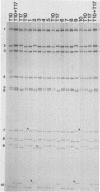Abstract
Two seronegative sheep were infected intravenously with 10(9) PFU each of bluetongue virus (BTV) serotype 10 and BTV serotype 17. One animal experienced a mild bluetongue-like disease, and both experienced a short-duration viremia and developed neutralizing immune responses to both virus serotypes. Progeny virus was isolated from venous blood from each animal by using conditions in which reassortment could not have occurred during isolation. Electropherotypes were determined for the progeny viruses from the infected sheep, yielding strikingly similar results for the two animals. In both sheep, serotype 10 dominated among the progeny, accounting for 92% of the progeny. Serotype 17 was rarely isolated and accounted for 3% of the progeny analyzed. The remaining 5% of the progeny clones were reassortant and derived genome segments from both serotypes 10 and 17. Analysis of the parental origin of genome segments in the small number of reassortant progeny analyzed suggested that selection of specific genome segments may have occurred in the infected sheep. These data indicate that reassortment of genome segments occurs, at low frequency, in sheep mixedly infected with BTV.
Full text
PDF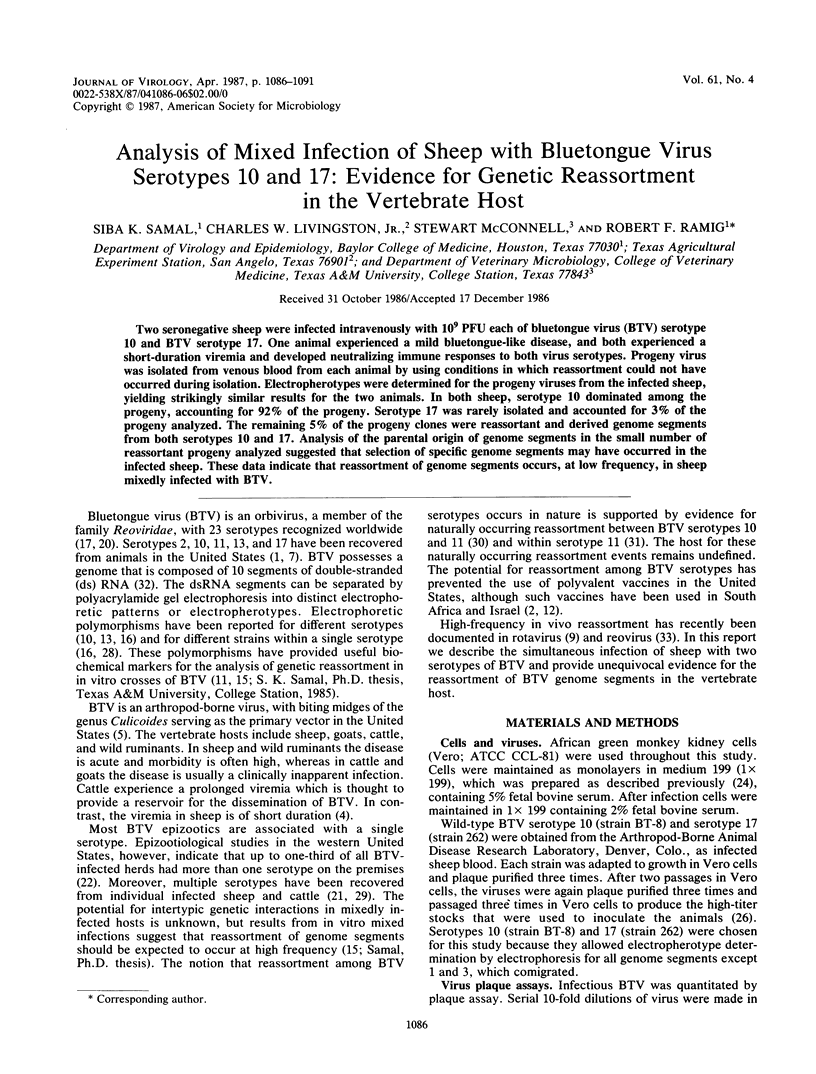
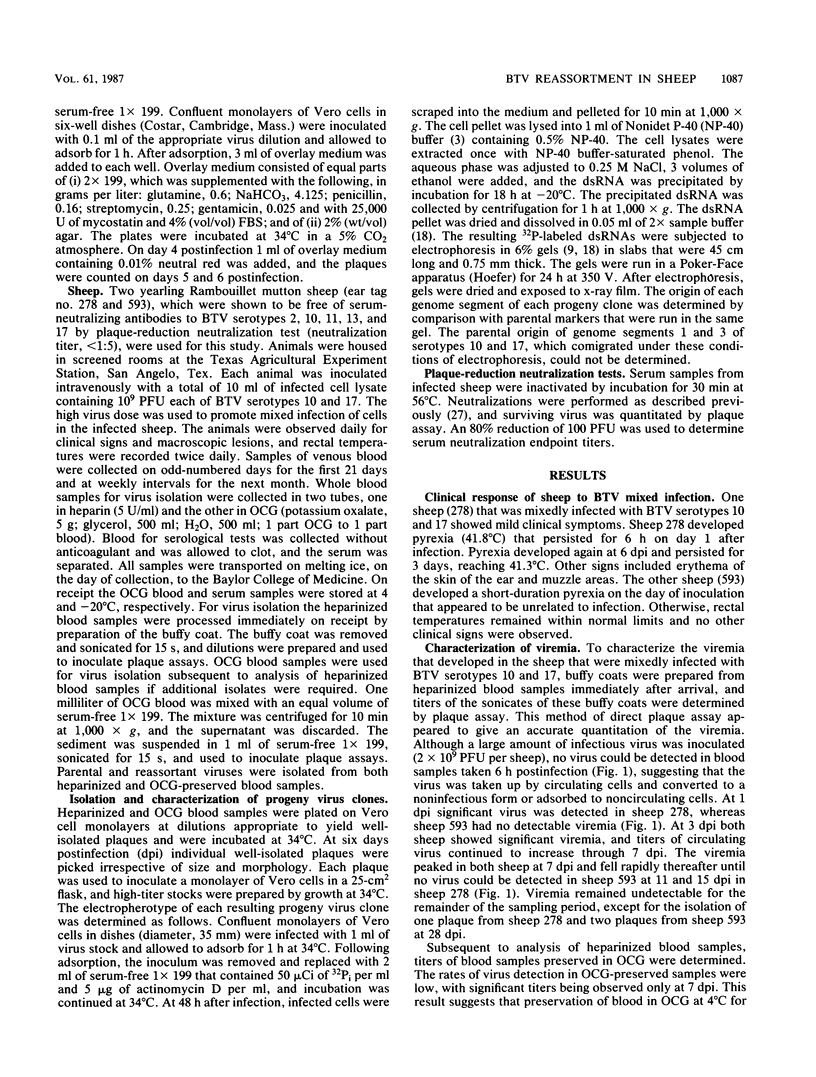
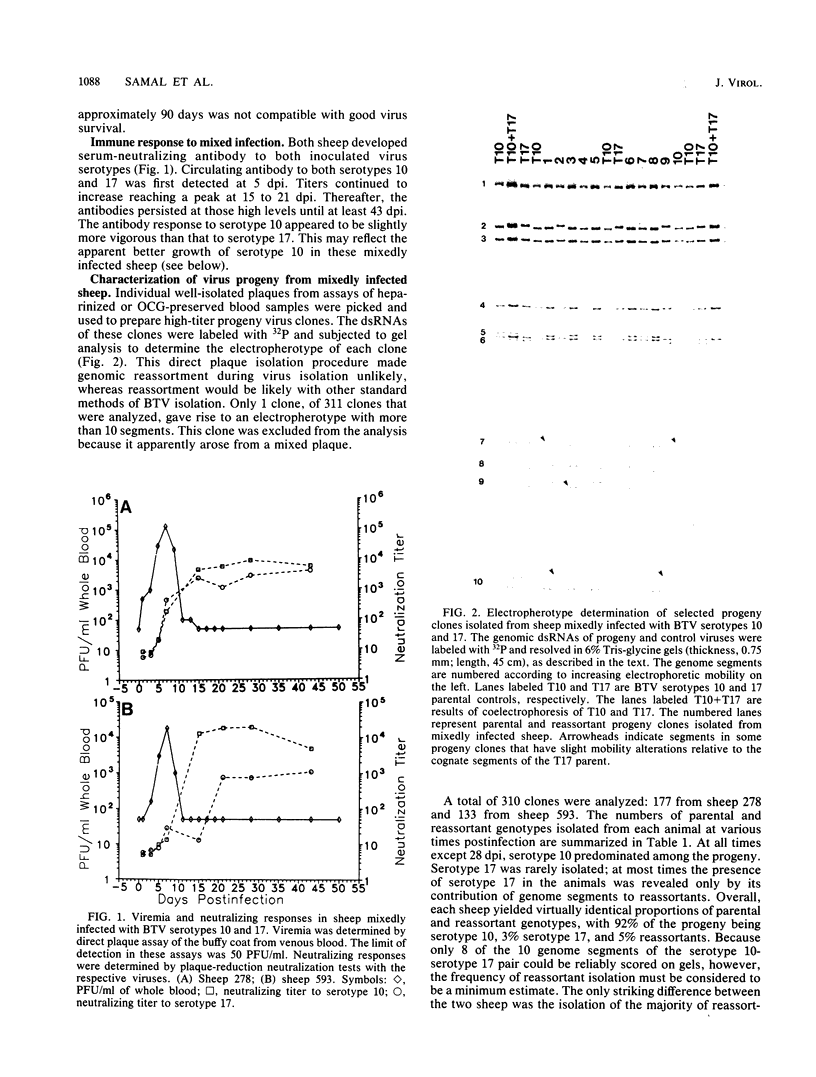
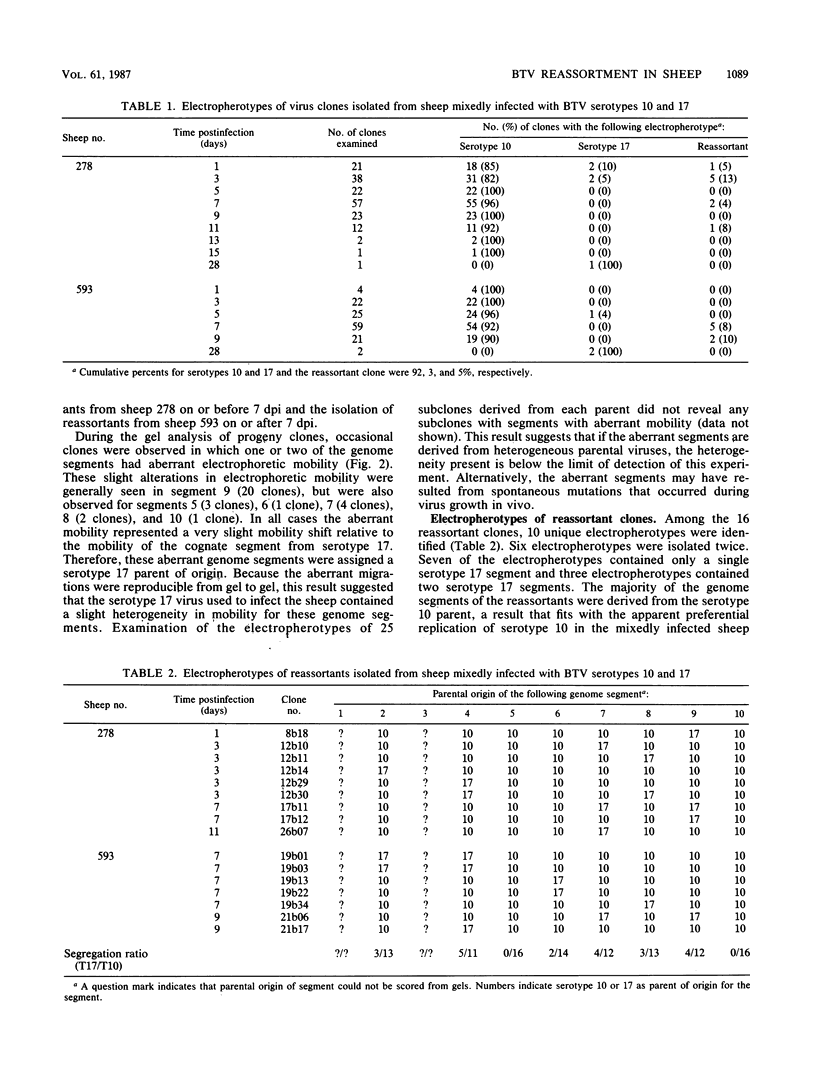
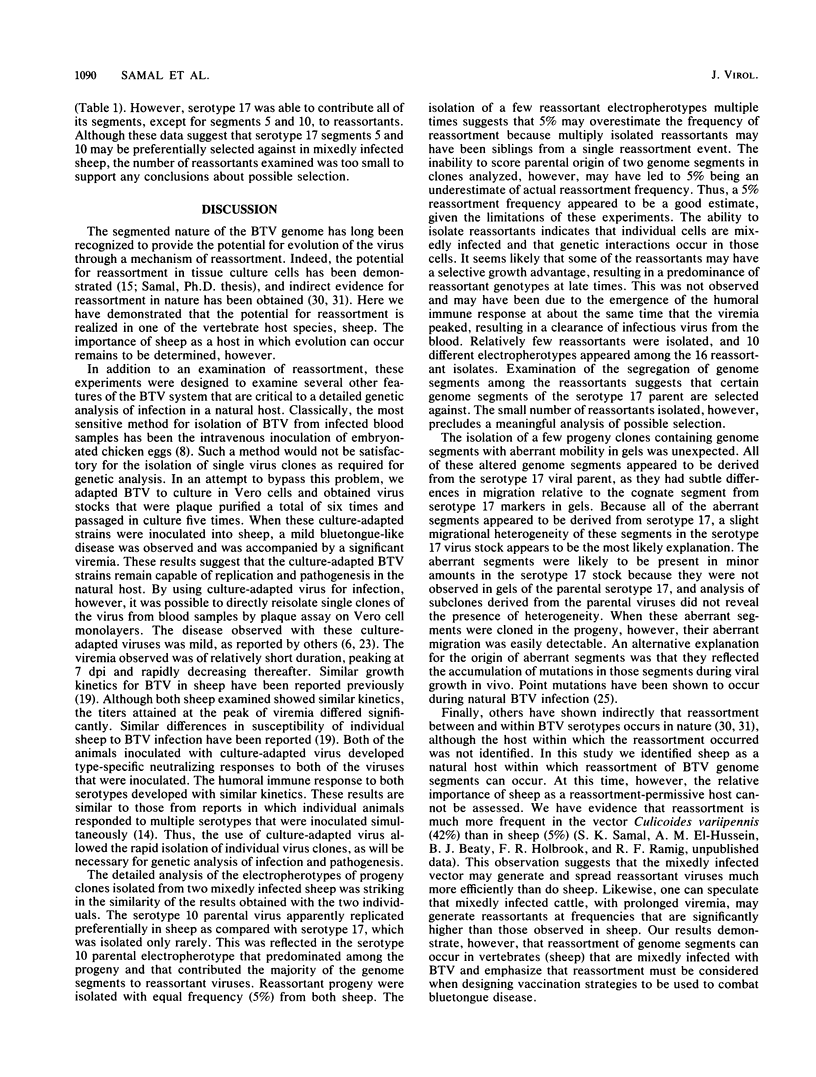
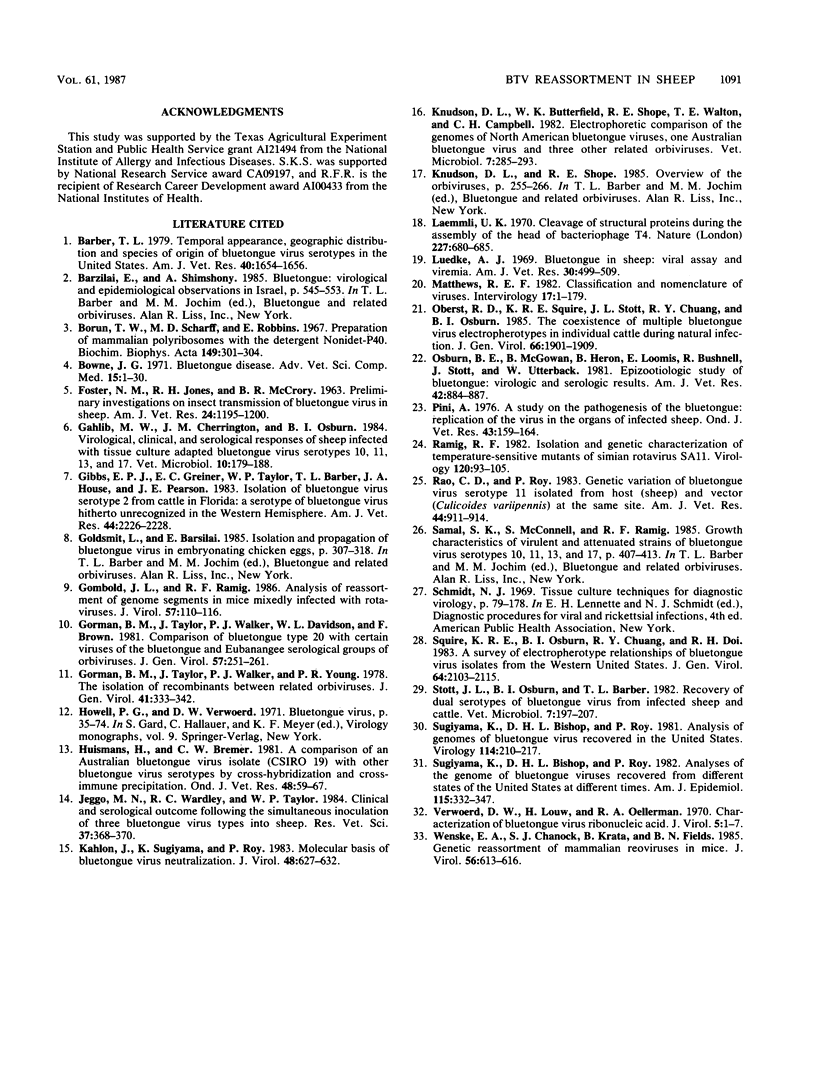
Images in this article
Selected References
These references are in PubMed. This may not be the complete list of references from this article.
- Barber T. L. Temporal appearance, geographic distribution, and species of origin of bluetongue virus serotypes in the United States. Am J Vet Res. 1979 Nov;40(11):1654–1656. [PubMed] [Google Scholar]
- Barzilai E., Shimshony A. Bluetongue: virological and epidemiological observations in Israel. Prog Clin Biol Res. 1985;178:545–553. [PubMed] [Google Scholar]
- Borun T. W., Scharff M. D., Robbins E. Preparation of mammalian polyribosomes with the detergent Nonidet P-40. Biochim Biophys Acta. 1967 Nov 21;149(1):302–304. doi: 10.1016/0005-2787(67)90715-0. [DOI] [PubMed] [Google Scholar]
- Bowne J. G. Bluetongue disease. Adv Vet Sci Comp Med. 1971;15:1–46. [PubMed] [Google Scholar]
- Classification and nomenclature of viruses. Fourth report of the International Committee on Taxonomy of Viruses. Intervirology. 1982;17(1-3):1–199. doi: 10.1159/000149278. [DOI] [PubMed] [Google Scholar]
- FOSTER N. M., JONES R. H., MCCRORY B. R. PRELIMINARY INVESTIGATIONS ON INSECT TRANSMISSION OF BLUETONGUE VIRUS IN SHEEP. Am J Vet Res. 1963 Nov;24:1195–1200. [PubMed] [Google Scholar]
- Ghalib H. W., Cherrington J. M., Osburn B. I. Virological, clinical and serological responses of sheep infected with tissue culture adapted bluetongue virus serotypes 10, 11, 13 and 17. Vet Microbiol. 1985 Jan;10(2):179–188. doi: 10.1016/0378-1135(85)90019-7. [DOI] [PubMed] [Google Scholar]
- Gibbs E. P., Greiner E. C., Taylor W. P., Barber T. L., House J. A., Pearson J. E. Isolation of bluetongue virus serotype 2 from cattle in Florida: serotype of bluetongue virus hitherto unrecognized in the Western Hemisphere. Am J Vet Res. 1983 Dec;44(12):2226–2228. [PubMed] [Google Scholar]
- Goldsmit L., Barzilai E. Isolation and propagation of bluetongue virus in embryonating chicken eggs. Prog Clin Biol Res. 1985;178:307–318. [PubMed] [Google Scholar]
- Gombold J. L., Ramig R. F. Analysis of reassortment of genome segments in mice mixedly infected with rotaviruses SA11 and RRV. J Virol. 1986 Jan;57(1):110–116. doi: 10.1128/jvi.57.1.110-116.1986. [DOI] [PMC free article] [PubMed] [Google Scholar]
- Gorman B. M., Taylor J., Walker P. J., Davidson W. L., Brown F. Comparison of bluetongue type 20 with certain viruses of the bluetongue and Eubenangee serological groups of orbiviruses. J Gen Virol. 1981 Dec;57(Pt 2):251–261. doi: 10.1099/0022-1317-57-2-251. [DOI] [PubMed] [Google Scholar]
- Gorman B. M., Taylor J., Walker P. J., Young P. R. The isolation of recombinants between related orbiviruses. J Gen Virol. 1978 Nov;41(2):333–342. doi: 10.1099/0022-1317-41-2-333. [DOI] [PubMed] [Google Scholar]
- Howell P. G., Verwoerd D. W. Bluetongue virus. Virol Monogr. 1971;9:35–74. doi: 10.1007/978-3-7091-3987-5_2. [DOI] [PubMed] [Google Scholar]
- Huismans H., Bremer C. W. A comparison of an australian bluetongue virus isolate (CSIRO 19) with other bluetongue virus serotypes by cross-hybridization and cross-immune precipitation. Onderstepoort J Vet Res. 1981 Jun;48(2):59–67. [PubMed] [Google Scholar]
- Jeggo M. H., Wardley R. C., Taylor W. P. Clinical and serological outcome following the simultaneous inoculation of three bluetongue virus types into sheep. Res Vet Sci. 1984 Nov;37(3):368–370. [PubMed] [Google Scholar]
- Kahlon J., Sugiyama K., Roy P. Molecular basis of bluetongue virus neutralization. J Virol. 1983 Dec;48(3):627–632. doi: 10.1128/jvi.48.3.627-632.1983. [DOI] [PMC free article] [PubMed] [Google Scholar]
- Knudson D. L., Butterfield W. K., Shope R. E., Walton T. E., Campbell C. H. Electrophoretic comparison of the genomes of North American bluetongue viruses, one Australian bluetongue virus, and three other related orbiviruses. Vet Microbiol. 1982 Sep;7(4):285–293. doi: 10.1016/0378-1135(82)90008-6. [DOI] [PubMed] [Google Scholar]
- Knudson D. L., Shope R. E. Overview of the orbiviruses. Prog Clin Biol Res. 1985;178:255–266. [PubMed] [Google Scholar]
- Laemmli U. K. Cleavage of structural proteins during the assembly of the head of bacteriophage T4. Nature. 1970 Aug 15;227(5259):680–685. doi: 10.1038/227680a0. [DOI] [PubMed] [Google Scholar]
- Luedke A. J. Bluetongue in sheep: viral assay and viremia. Am J Vet Res. 1969 Apr;30(4):499–509. [PubMed] [Google Scholar]
- Oberst R. D., Squire K. R., Stott J. L., Chuang R. Y., Osburn B. I. The coexistence of multiple bluetongue virus electropherotypes in individual cattle during natural infection. J Gen Virol. 1985 Sep;66(Pt 9):1901–1909. doi: 10.1099/0022-1317-66-9-1901. [DOI] [PubMed] [Google Scholar]
- Osburn B. I., McGowan B., Heron B., Loomis E., Bushnell R., Stott J., Utterback W. Epizootiologic study of bluetongue: virologic and serologic results. Am J Vet Res. 1981 May;42(5):884–887. [PubMed] [Google Scholar]
- Pini A. Study on the pathogenesis of bluetongue: replication of the virus in the organs of infected sheep. Onderstepoort J Vet Res. 1976 Dec;43(4):159–164. [PubMed] [Google Scholar]
- Ramig R. F. Isolation and genetic characterization of temperature-sensitive mutants of simian rotavirus SA11. Virology. 1982 Jul 15;120(1):93–105. doi: 10.1016/0042-6822(82)90009-5. [DOI] [PubMed] [Google Scholar]
- Rao C. D., Roy P. Genetic variation of bluetongue virus serotype 11 isolated from host (sheep) and vector (Culicoides variipennis) at the same site. Am J Vet Res. 1983 May;44(5):911–914. [PubMed] [Google Scholar]
- Samal S. K., McConnell S., Ramig R. F. Growth characteristics of virulent and attenuated strains of bluetongue virus serotypes 10, 11, 13 and 17. Prog Clin Biol Res. 1985;178:407–412. [PubMed] [Google Scholar]
- Squire K. R., Osburn B. I., Chuang R. Y., Doi R. H. A survey of electropherotype relationships of bluetongue virus isolates from the western United States. J Gen Virol. 1983 Oct;64(Pt 10):2103–2115. doi: 10.1099/0022-1317-64-10-2103. [DOI] [PubMed] [Google Scholar]
- Stott J. L., Osburn B. I., Barber T. L. Recovery of dual serotypes of bluetongue virus from infected sheep and cattle. Vet Microbiol. 1982 Jul;7(3):197–207. doi: 10.1016/0378-1135(82)90034-7. [DOI] [PubMed] [Google Scholar]
- Sugiyama K., Bishop D. H., Roy P. Analyses of the genomes of bluetongue viruses recovered in the United States. I. Oligonucleotide fingerprint studies that indicate the existence of naturally occurring reassortant BTV isolates. Virology. 1981 Oct 15;114(1):210–217. doi: 10.1016/0042-6822(81)90266-x. [DOI] [PubMed] [Google Scholar]
- Sugiyama K., Bishop D. H., Roy P. Analysis of the genomes of bluetongue viruses recovered from different states of the United States and at different times. Am J Epidemiol. 1982 Mar;115(3):332–347. doi: 10.1093/oxfordjournals.aje.a113310. [DOI] [PubMed] [Google Scholar]
- Verwoerd D. W., Louw H., Oellermann R. A. Characterization of bluetongue virus ribonucleic acid. J Virol. 1970 Jan;5(1):1–7. doi: 10.1128/jvi.5.1.1-7.1970. [DOI] [PMC free article] [PubMed] [Google Scholar]
- Wenske E. A., Chanock S. J., Krata L., Fields B. N. Genetic reassortment of mammalian reoviruses in mice. J Virol. 1985 Nov;56(2):613–616. doi: 10.1128/jvi.56.2.613-616.1985. [DOI] [PMC free article] [PubMed] [Google Scholar]



